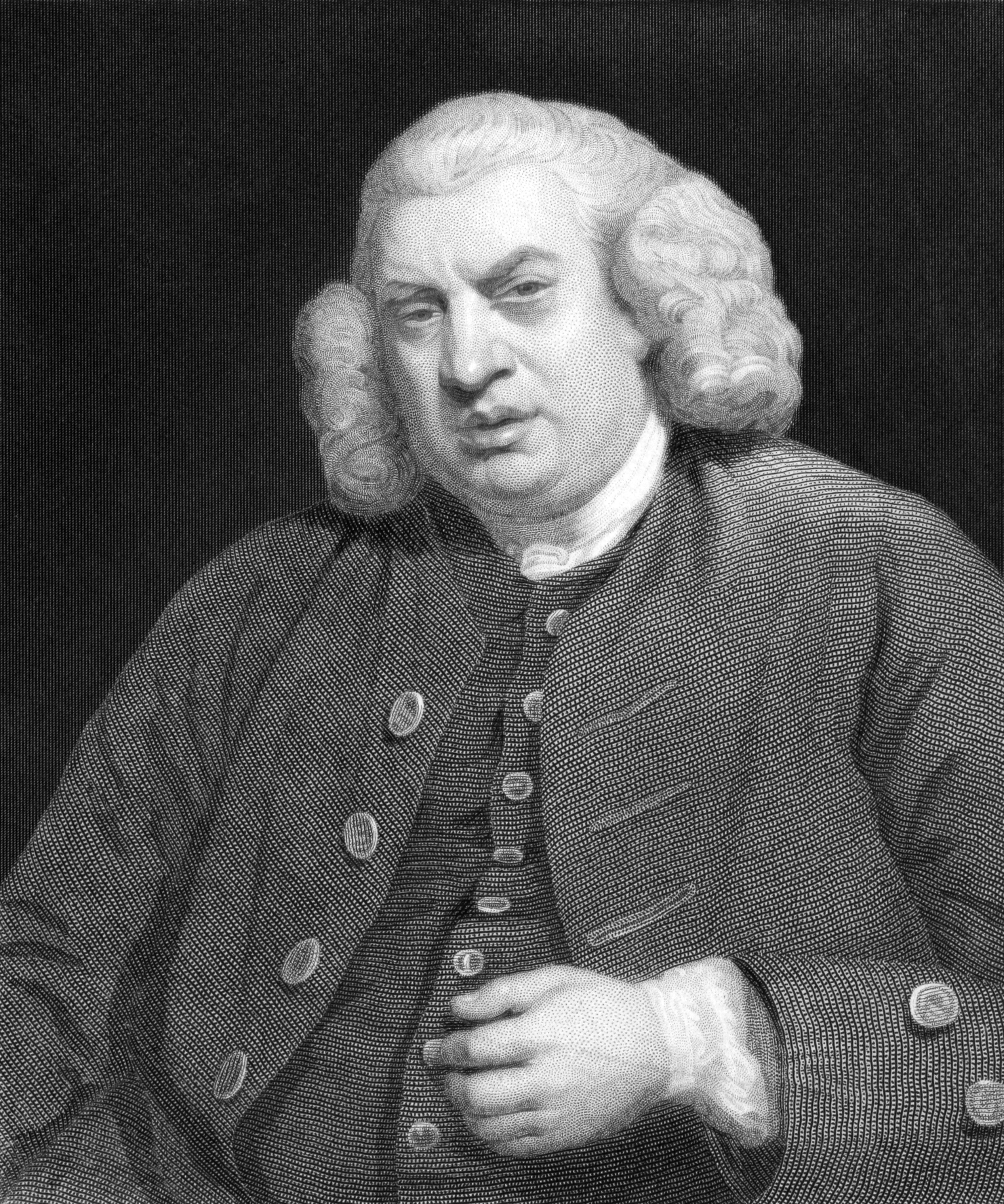Samuel Johnson frasi celebri
“Richardson aveva colto il nocciolo della vita… mentre Fielding si era accontentato del guscio.”
da Thraliana , a cura di Balderston, I, p. 555
riferendosi ai critici; citato in James Boswell, Vita di Samuel Johnson, 1754
citato in James Boswell, Vita di Samuel Johnson, 14 luglio 1763
“Ciò che è scritto senza sforzo è generalmente letto senza piacere.”
da Miscellanies
Johnson Miscellanies
Samuel Johnson Frasi e Citazioni
“Fielding è capace di descrivere un cavallo o un asino ma non ci è mai riuscito con un mulo.”
da Johnson Miscellanies, a cura di George Birkbeck Norman Hill, I, pp. 273-4
Origine: Citato in Ian Watt, Le origini del romanzo borghese (The Rise Of The Novel), traduzione di Luigi Del Grosso Destrieri, Bompiani, Milano, 1985.
“Le cifre tonde sono sempre false.”
citato in Apophthegms, Sentiments, Opinions and Occasional Reflections di Sir John Hawkins, in Johnsonian Miscellanies (1897), vol. II, pag. 2, edito da George Birkbeck Hill
Johnson Miscellanies
citato in James Boswell, Vita di Samuel Johnson, 30 aprile 1773
Origine: Citato in John Lukacs, Democrazia e populismo, traduzione di Giovanni Ferrara degli Uberti, Longanesi, 2006, p. 152.
citato in James Boswell, Vita di Samuel Johnson
Your manuscript is both good and original, but the part that is good is not original and the part that is original is not good.
[Citazione errata] Questa citazione viene spesso attribuita a Johnson ma non trova alcun riscontro nelle opere o nelle lettere dello scrittore, né tanto meno nelle biografie di Johnson scritte dai suoi contemporanei.
Attribuite
Origine: Samuel Johnson did not say: "Your manuscript is both good and original. But the part that is good is not original, and the part that is original is not good." http://www.samueljohnson.com/goodorig.html, Samuel Johnson.com.
“In quante poche case degli amici sceglierebbe di stare un uomo quando è ammalato!”
Origine: Citato in Boswell, Life of Johnson, IV.
Origine: Citato in Dizionario delle citazioni, a cura di Italo Sordi, BUR, 1992. ISBN 14603-X
“La natura ha dato alla donna un tale potere che la legge ha giustamente deciso di dargliene poco.”
Origine: Da Letters, I.
Origine: Citato in Dizionario delle citazioni, a cura di Italo Sordi, BUR, 1992. ISBN 14603-X
Samuel Johnson: Frasi in inglese
1770, p. 181
Life of Samuel Johnson (1791), Vol II
Origine: The History of Rasselas, Prince of Abissinia (1759), Chapter 10
“It is man's own fault, it is from want of use, if his mind grows torpid in old age.”
April 9, 1778
Life of Samuel Johnson (1791), Vol III
“A country governed by a despot is an inverted cone.”
April 14, 1778
Life of Samuel Johnson (1791), Vol III
“From Thee, great God: we spring, to Thee we tend,
Path, motive, guide, original, and end.”
Reported in Josiah Hotchkiss Gilbert, Dictionary of Burning Words of Brilliant Writers (1895), p. 257
Origine: Anecdotes of Samuel Johnson (1786), p. 67
Origine: The History of Rasselas, Prince of Abissinia (1759), Chapter 48
The Life of Milton
Lives of the English Poets (1779–81)
August 15, 1773
The Journal of a Tour to the Hebrides (1785)
Seward, 617
Bartlett's Familiar Quotations, 10th ed. (1919), Johnsoniana
Epitaph on Goldsmith
Bartlett's Familiar Quotations, 10th ed. (1919)
1779
Bartlett's Familiar Quotations, 10th ed. (1919), Life of Johnson (Boswell)
“Cold approbation gave the ling'ring bays,
For those who durst not censure, scarce could praise.”
Prologue at the Opening of Drury Lane Theatre (1747)
“Melancholy, indeed, should be diverted by every means but drinking.”
1776 http://books.google.com/books?id=fcIIAAAAQAAJ&q=%22Melancholy+indeed+should+be+diverted+by+every+means+but+drinking%22&pg=PA6#v=onepage
Bartlett's Familiar Quotations, 10th ed. (1919), Life of Johnson (Boswell)
“A fellow that makes no figure in company, and has a mind as narrow as the neck of a vinegar-cruet.”
Tour to the Hebrides, Sept. 30, 1773
Bartlett's Familiar Quotations, 10th ed. (1919)
“The richest author that ever grazed the common of literature.”
Of John Campbell, as quoted by Joseph Wharton; reported in "John Campbell", Encyclopedia Britannica (1911)
“We are inclined to believe those whom we do not know, because they have never deceived us.”
No. 80 (October 27, 1759)
The Idler (1758–1760)
“No place affords a more striking conviction of the vanity of human hopes than a public library.”
No. 106 (23 March 1751)
The Rambler (1750–1752)
“I never have sought the world; the world was not to seek me.”
March 23, 1783
Life of Samuel Johnson (1791), Vol IV
1781, p. 477, Referring to subscribers to his edition of The Plays of William Shakespeare, with Notes (1765)
Life of Samuel Johnson (1791), Vol IV
June 1784, p. 526 http://books.google.com/books?id=FMoIAAAAQAAJ&q="Courage+is+a+quality+so+necessary+for+maintaining+virtue+that+it+is+always+respected+even+when+it+is+associated+with+vice"&pg=PA319#v=onepage
Life of Samuel Johnson (1791), Vol IV
Origine: The History of Rasselas, Prince of Abissinia (1759), Chapter 29
1780, p. 446
Life of Samuel Johnson (1791), Vol IV
Origine: Anecdotes of Samuel Johnson (1786), p. 252
“Every state of society is as luxurious as it can be. Men always take the best they can get.”
April 14, 1778
Life of Samuel Johnson (1791), Vol III
Epitaph on Claudius Philips, the Musician
Bartlett's Familiar Quotations, 10th ed. (1919)
Life of Milton
Bartlett's Familiar Quotations, 10th ed. (1919)
